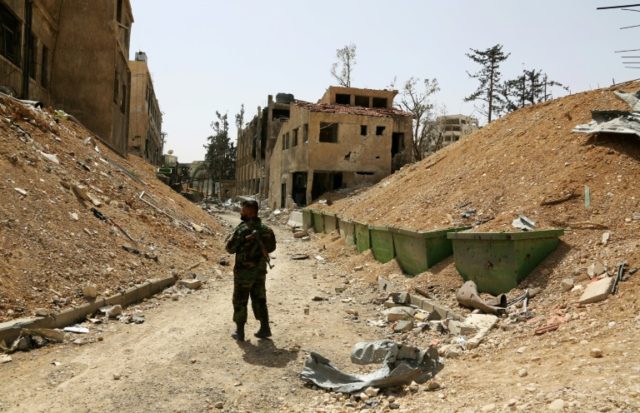Inspectors from the Organization for the Prohibition of Chemical Weapons (OPCW) are seeking to exhume the bodies of victims from the suspected chemical weapons attack in Douma, Syria, on the theory that traces of nerve agents like sarin gas will linger in human tissue for much longer than environmental samples from the attack site.
“From the bodies already buried we are looking for ways to exhume if possible and take some biomedical samples. It is a very sensitive process. That’s why we are very cautious,” OPCW Director-General Ahmet Uzumcu told the Financial Times in an interview published Wednesday.
“Although our experts have been able to attend some autopsies in the past this is going to be the first time we have exhumed bodies,” he added.
Uzumcu added he has not been able to “verify allegations that inspectors had been blocked or whether evidence had been removed or tampered with by Syrian forces.”
U.S. and European officials voiced concerns that inspectors were kept away from the site so Syrian and Russian agents could sanitize them. The task facing the OPCW is seen as particularly difficult because the attack may have involved both chlorine and sarin gas, the former masking the presence of the latter.
Uzumcu mentioned in his Financial Times interview that the OPCW does not presently have a mandate to assign blame for chemical weapons attacks. He viewed this as a “serious gap” and urged the international community to grant such a mandate.
In an April 26 joint statement, OPCW member states said the fact-finding mission to Syria was “conducting their work in extremely difficult circumstances.”
“Instead of working with the OPCW to support their investigation, Syria and Russia have continued to create obstacles to delay their deployment to Duma and to wage a propaganda campaign against the OPCW,” the statement charged.
The statement noted that medical non-government organizations have “found traces of chemical agents on the victims” and collected authentic photos and videos of the attack site. Over 500 patients presented symptoms of chemical exposure on the day of the attack, April 7.
Russia’s military intervention in Syria remains ongoing. On Thursday morning, a top-shelf Russian Sukhoi-30SM fighter jet crashed shortly after takeoff from the Khmeimim airbase in Syria, killing both crewmembers.
Russian officials said the crash might have been caused by “birds getting into the engine,” and insisted the plane “was not struck by any projectile.”

COMMENTS
Please let us know if you're having issues with commenting.